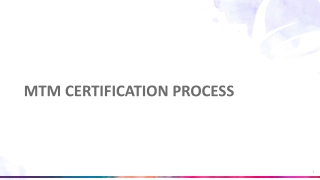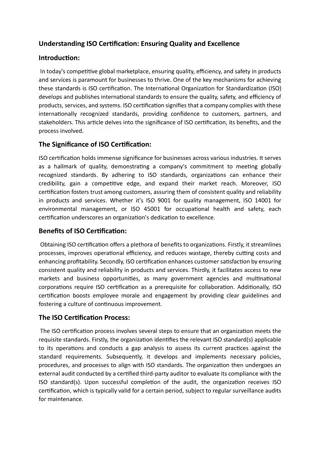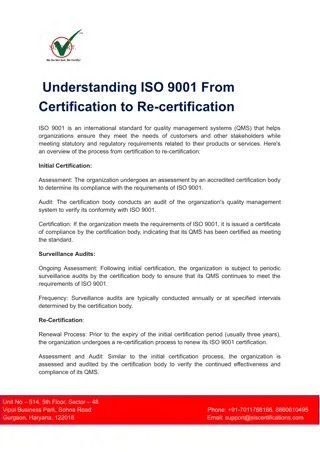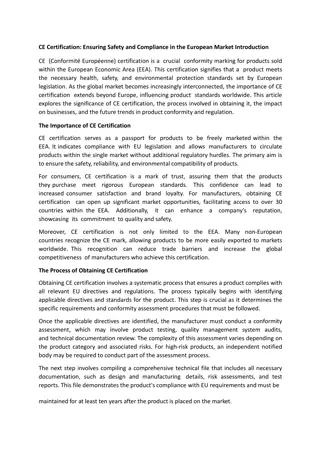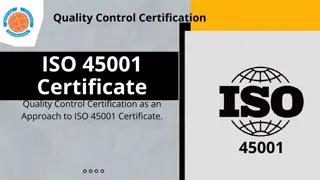ACERCA DE CE CERTIFICATION
El marcado CE es una marca de certificaciu00f3nesencialsiplanea vender suproductoenel Espacio Econu00f3micoEuropeo (EEE). CE: u201cConformiteEuropeneu201d, que significaconformidadeuropea. Estamarca describe elproducto y suembalajeestu00e1fabricado de acuerdo con las Directivaseuropeas. Ademu00e1s, elmarcado CE aumenta la credibilidad y la rentabilidad de sunegocio.nn
Download Presentation

Please find below an Image/Link to download the presentation.
The content on the website is provided AS IS for your information and personal use only. It may not be sold, licensed, or shared on other websites without obtaining consent from the author. Download presentation by click this link. If you encounter any issues during the download, it is possible that the publisher has removed the file from their server.
E N D
Presentation Transcript
CE Certification: Ensuring Safety and Compliance in the European Market Introduction CE (Conformit Europ enne) certification is a crucial conformity marking for products sold within the European Economic Area (EEA). This certification signifies that a product meets the necessary health, safety, and environmental protection standards set by European legislation. As the global market becomes increasingly interconnected, the importance of CE certification extends beyond Europe, influencing product standards worldwide. This article explores the significance of CE certification, the process involved in obtaining it, the impact on businesses, and the future trends in product conformity and regulation. The Importance of CE Certification CE certification serves as a passport for products to be freely marketed within the EEA. It indicates compliance with EU legislation and allows manufacturers to circulate products within the single market without additional regulatory hurdles. The primary aim is to ensure the safety, reliability, and environmentalcompatibility of products. For consumers, CE certification is a mark of trust, assuring them that the products they purchase meet rigorous European standards. increased consumer satisfaction and brand loyalty. For manufacturers, obtaining CE certification can open up significant market opportunities, facilitating access to over 30 countries within the EEA. Additionally, it showcasing its commitment to quality and safety. This confidence can lead to can enhance a company s reputation, Moreover, CE certification is not only limited to the EEA. Many non-European countries recognize the CE mark, allowing products to be more easily exported to markets worldwide. This recognition can reduce competitiveness of manufacturers who achieve this certification. trade barriers and increase the global The Process of Obtaining CE Certification Obtaining CE certification involves a systematic process that ensures a product complies with all relevant EU directives and regulations. The process typically begins with identifying applicable directives and standards for the product. This step is crucial as it determines the specific requirements and conformity assessment procedures that must be followed. Once the applicable directives are identified, the manufacturer must conduct a conformity assessment, which may involve product testing, quality management system audits, and technical documentation review. The complexity of this assessment varies depending on the product category and associated risks. For high-risk products, an independent notified body may be requiredto conduct part of the assessment process. The next step involves compiling a comprehensive technical file that includes all necessary documentation, such as design and manufacturing details, risk assessments, and test reports.This file demonstrates the product's compliance with EU requirements and must be maintainedfor at least ten years after the product is placed on the market.
After manufacturer must draft and sign an EU Declaration of Conformity. This declaration is a legal statement affirming that the product meets all relevant requirements. Finally, the CE mark is affixed to the product, allowing it to be sold within the EEA. completing the conformity assessment and technical documentation, the Impact on Businesses CE certification has a profound impact on businesses, particularly those seeking to expand into the European market. Achieving CE certification can be resource-intensive, requiring time, expertise, and financial investment. However, the benefits often outweigh these initial costs. For companies, CE certification can lead to increased market access and growth opportunities. By meeting EU standards, businesses economically significant market, potentially boosting sales and revenue. Moreover, CE certification can enhance a company's competitive edge, as it signifies a commitment to quality and compliance. can tap into a large and Additionally, CE certification can lead to improved internal processes and product quality. The rigorous conformity assessment documentation, quality control, and risk management practices. This focus on quality can reduce product recalls, improve customer satisfaction, and ultimately lead to long-term business success. process often necessitates better Furthermore, other markets. Many countries outside the EEA have similar regulatory frameworks, and a CE- certified product may more easily meet their requirements. This alignment can simplify the process of entering new international markets, further expanding business opportunities. CE certification can facilitate smoother regulatory compliance in Future Trends in Product Conformity and Regulation The landscape of product conformity and regulation is continually evolving, driven by technological advancements, environmental expectations. One significant trend is the increasing emphasis on sustainability and environmental impact. As the EU pushes for greener policies and stricter environmental standards, manufacturers must adapt to meet these new requirements. considerations, and shifting consumer Digitalization is another key trend shaping the future of CE certification. The integration of digital technologies into products, such artificial intelligence (AI), presents new regulatory challenges. Ensuring the safety and compliance of these advanced products sophisticated conformity assessment procedures. as the Internet of Things (IoT) and requires updated standards and more Furthermore, the global nature of trade means that international harmonization of standards is becoming more important. Efforts to align CE certification with other international standards could simplify manufacturers and promote global trade. duplication of testing and certification efforts, leading to cost savings and faster time-to-market. the harmonization compliance process help for This can reduce
Lastly, consumer awareness and demand for safe and compliant products are on the rise. Consumers are becoming more informed about product safety and environmental impact, influencing their purchasing decisions. importance of CE certification as a means to build consumer trust and brand loyalty. This trend underscores the Conclusion CE certification plays a vital role in ensuring the safety, reliability, and environmental sustainability of products within the European Economic Area. It offers significant benefits for consumers, manufacturers, and the broader market. The process of obtaining CE certification, while demanding, can lead to enhanced market access, improved product quality, and increased competitiveness. As regulatory landscapes evolve and new challenges emerge, the importance of CE certification will continue to grow, driving innovation and ensuring that products meet the highest standards of safety and compliance.



